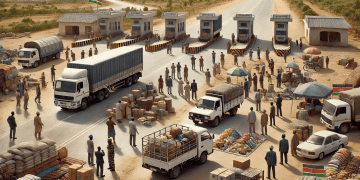In a recent report by Supply Chain Report, startling statistics have highlighted Bulgaria’s significant disparity between fresh produce imports and exports. The data underscores a notable trend where imports of fresh produce into Bulgaria substantially outweigh its exports, reflecting a concerning imbalance in the nation’s agricultural trade.
According to the findings, Bulgaria has been increasingly reliant on imported fresh produce to meet domestic demand, while its own exports in this sector have been comparatively minimal. This trend has raised concerns among industry experts about the sustainability and competitiveness of Bulgaria’s agricultural sector in the global market.
The report identifies several factors contributing to this trade imbalance. Firstly, logistical challenges and supply chain inefficiencies within Bulgaria’s agricultural sector have hindered its ability to compete effectively on the international stage. Additionally, varying agricultural practices and standards across different regions have posed barriers to expanding export capabilities.
Moreover, economic factors such as fluctuating exchange rates and competitive pricing strategies employed by exporting countries have further complicated Bulgaria’s efforts to enhance its export volumes. These dynamics have underscored the need for strategic interventions and policy reforms to bolster Bulgaria’s agricultural export capabilities and reduce its dependence on imports.
Looking ahead, stakeholders in Bulgaria’s agricultural sector are urged to prioritize initiatives that enhance supply chain transparency, efficiency, and resilience. By addressing these challenges, Bulgaria can potentially rebalance its fresh produce trade and foster a more sustainable and competitive agricultural economy on the global stage.
Stay updated with supply chain news at The Supply Chain Report. Learn more about international trade at ADAMftd.com with free tools.
#BulgariaAgriculture #FreshProduceTrade #AgriculturalImbalance #SupplyChainChallenges #ExportImportDiscrepancy #AgriculturalSector #TradeImbalance #GlobalMarket #LogisticalIssues #EconomicFactors #SustainableAgriculture #SupplyChainReport #PolicyReforms #ExportCapabilities #ImportDependence

















